 |
| Julia Roberts as Kitty Kiernana |
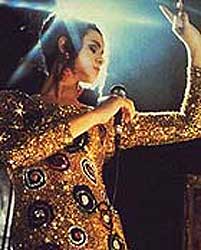 |
| Jaye Davidson as Dil |
 |
| Orla Fitzgerald as Sinead |
 |
| Sarah Miles as Rosy Ryan |
 |
| Helen Mirren as Kathleen Quigly and Fionnula Flanagan as Annie Higgins |
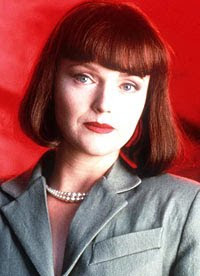 |
| Miranda Richardson as Jude in The Crying Game |
The radical notion that women like good movies
 |
| Julia Roberts as Kitty Kiernana |
 |
| Jaye Davidson as Dil |
 |
| Orla Fitzgerald as Sinead |
 |
| Sarah Miles as Rosy Ryan |
 |
| Helen Mirren as Kathleen Quigly and Fionnula Flanagan as Annie Higgins |
 |
| Miranda Richardson as Jude in The Crying Game |
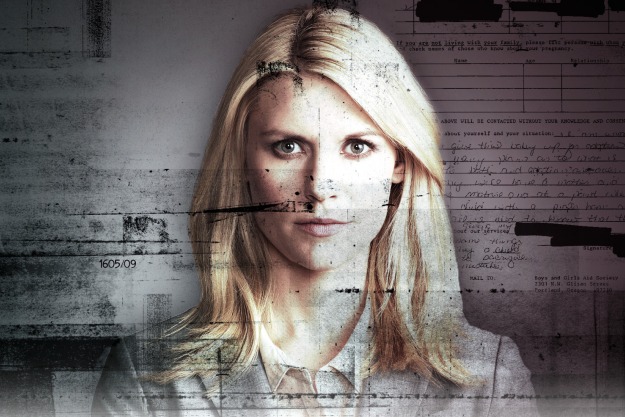 |
| Carrie Mathison, a haunted yet brilliant CIA analyst |
I hate straight singing. I have to change a tune to my own way of doing it. That’s all I know.
— Billie Holiday
So while it is true that jazz is a demanding and competitive field for both men and women, it is also true that a woman who shows up for an audition or jam session with a tenor sax or trumpet in her gig bag is greeted with a special variety of raised eyebrows, curiosity and skepticism. Is she serious? Can she play? Time-worn questions about women and jazz buzz through the room before she blows a note.
 |
| Carrie’s personal and professional lives weave together–the professional trumps the personal, but her private battles threaten her career. |
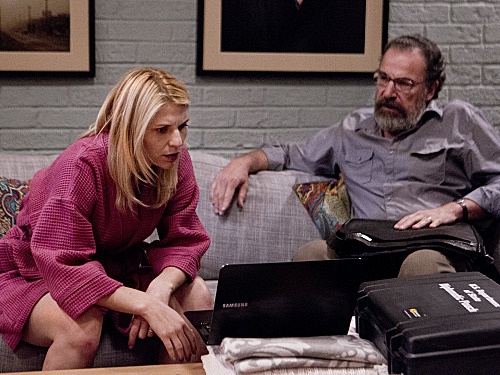 |
| Saul serves as a mentor to Carrie. (Patinkin has been outspoken about issues of television and feminism.) |
It’s ill-becoming for an old broad to sing about how bad she wants it. But occasionally we do.
— Lena Horne
Jazz is not just music, it’s a way of life, it’s a way of being, a way of thinking. . . . the new inventive phrases we make up to describe things — all that to me is jazz just as much as the music we play.
— Nina Simone
Monk was hospitalised at various points in his career due to an unspecified mental illness and there has been some debate about whether he could have had a schizophrenic or bipolar disorder. (In fact, jazz and schizophrenia have long been linked. It is argued that New Orleans cornetist Buddy Bolden, the ‘inventor of jazz’, improvised the music he played as his schizophrenia did not allow him to read music, evolving ragtime into a more free form of music in the process.) It is an association that positions Carrie, who takes anti-psychotics, as a ‘crazy genius’ like Monk.
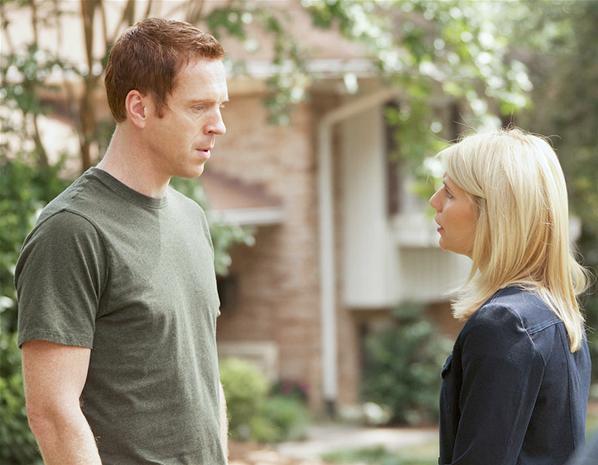 |
| Nick Brody and Carrie develop a complicated relationship, although her theories of his terrorist involvement were correct. |
One day a whole damn song fell into place in my head.
— Billie Holiday
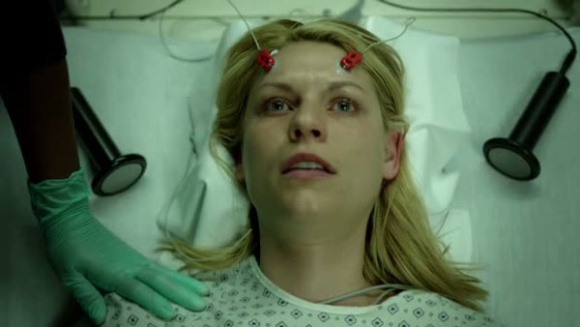 |
| Carrie chooses to undergo ECT, as she convinces herself in Season 1 that her suspicions about Brody are delusions. |
Carrie does not suffer from the common female need-to-please trait and, in fact, insists she is usually right. She is impulsive in a job that rewards patience and lies to the few people who can tolerate her…You root for her because those very despicable qualities also make her extraordinarily good at her mission. Danes breathes life and realism into a character who, for once, goes against the clichés of what a female CIA officer is supposed to do and look like.
 |
| The Women, War & Peace Documentary Series on PBS |
While rape had been charged as a crime before, it usually falls under the umbrella of hate crimes. With this groundbreaking tribunal, for the first time rape was charged as “a crime against humanity.” The case wouldn’t prevent all rapes. But Kuo said that even though they couldn’t prosecute every rape, it was a significant statement to acknowledge what happens to women during war. The case “transformed the definition of wartime slavery,” laying the “foundation of trials involving violence against women in international courts.”
War leaves devastation in its wake. Yet historically, when we talk about war, we talk about it in terms of soldiers and casualties; too often from a male perspective, forgetting that it equally destroys women’s lives.
In the 2nd installment of the Women, War & Peace series, director Gini Reticker and producer Abigail E. Disney, and WWP series executive producers and co-creators, create a Tribeca Film Festival-winning documentary. Pray the Devil Back to Hell tells the powerful and uplifting story of the Liberian women, including activist and social worker Leymah Gbowee, who joined together and peacefully protested, helping end the civil war ravaging their country.
For almost 15 years, beginning on Christmas Eve in 1989, two civil wars plagued Liberia. Warlord and former president Charles Taylor resided at the center of both. He overthrew the regime during the first civil war and committed war crimes and human rights atrocities while president during the second civil war. Taylor recruited soldiers as young as 9-15 years old. With his private army, the dictator controlled the finances and terrorized the country.
Hasina Safi, one of the 3,000 members of the Afghan Women’s Network (AWN), a non-partisan NGO working to empower women, visits villages to monitor the programs she coordinates for illiterate women. Classes for women could not be held openly with the Taliban in power. Almost 90% of Afghan women cannot read or write. Through classes, many women are just learning Islam encourages women’s education.
But working women like Safi risk their lives. They receive death threats via horrific letters in the night, telling them they must stop working or else their children will be killed and their homes burned.
Over the course of the last two decades, at least 16 million acres of land have been violently taken from Colombians. In the last 8 years, over 2 million have been displaced. Colombia has the second largest number of internally displaced people in the world after Sudan. With no jobs and contaminated water, displacement traumatizes civilians and rips families apart. Under international law,internally displaced citizens don’t receive the same protections that refugees do. Their government is supposed to address their rights. But in this case, how are Colombians supposed to obtain justice when their own government condemns them?
Afro-Colombians make up one quarter of Colombia’s population. In May 2010, coinciding with Afro-Colombian Day, which commemorates the end of slavery in Colombia, Sarria’s eviction was set to commence. People took to the streets, barricading the road to halt the eviction.
‘War Redefined’ Challenges War as a Male Domain and Examines How Violent Conflict Impacts Women:
When we think of war, we often think of soldiers, tanks, weapons and battlefields. But most wars breach boundaries, affecting civilians, mostly women and children. Soldiers, guerillas and paramilitaries use tactics such as rape, fear, murder and pushing people off their land. We need to shift our paradigm of war and look at how it affects women’s lives.
War Redefined, the 5th and final installment in Women, War & Peace (WWP), is the capstone of the groundbreaking series featuring politicians, military personnel, scholars and activists discussing how women play a vital role in war and peace-keeping. Narrated by actor Geena Davis, a phenomenal women’s media activist, written and produced by Peter Bull, co-produced by Nina Chaudry, this powerful film threads stories told in the other parts of the series: Bosnian women surviving rape camps, Liberian women protesting for peace, Afghan women demanding their rights in negotiations and Afro-Colombian women contending with internal displacement. War Redefined, and the entire WWP series, challenges the assumption that war and peace belong to men’s domain.
 |
| The Lady (2012) |
 |
| Network DVD Art |
 |
| Diana Christensen |
 |
| Howard Beale’s Rant |
 |
| Diana celebrating The Howard Beale Show’s success |
Myrna Waldron is a feminist writer/blogger with a particular emphasis on all things nerdy. She lives in Toronto and has studied English and Film at York University. Myrna has a particular interest in the animation medium, having written extensively on American, Canadian and Japanese animation. She also has a passion for Sci-Fi & Fantasy literature, pop culture literature such as cartoons/comics, and the gaming subculture. She maintains a personal collection of blog posts, rants, essays and musings at The Soapboxing Geek, and tweets with reckless pottymouthed abandon at @SoapboxingGeek.
 |
| Movie still from The Great McGinty |
This change has been both rapid and recent, as well into the 20th Century women were barely present in politics, at least on the front lines as elected leaders. And while women have been a growing presence in the House of Representatives since 1917, Hollywood was less than progressive in its depiction of women serving in political offices. Politics in films made in the ’40s and ’50s was strictly a man’s world, with the men taking charge as both the heroes and the villains, the bosses of the corrupt political machines and the up-and-comers either succumbing to them or fighting back against them. But these films were not devoid of women, but those women had their own roles to play.
Female characters in these political films found a niche into which they could be fit, a trope on which sufficient variations could be introduced that it ended up showing up multiple times over the decades. When considering this type of character the phrase “Behind every great man is a great woman” comes to mind. That is where the women in these movies stood: behind the man, attempting to push him toward greatness, sometimes successfully, sometimes not. These Great Women did not achieve anything on their own, or draw attention to themselves, but were behind-the-scenes players using the power they had over the protagonist in pursuit of their goals.
The most generic and straightforward example of this type of character appears in the 1940 film The Great McGinty, the directorial debut of Preston Sturges. As blunt a political satire as they come, the film tells the story of a bum who walks the crooked path to political stardom. Dan McGinty (Brian Donlevy) is hired by a political boss to help rig elections, and ends up so impressing his superiors that they keep on promoting him. McGinty is convinced to run for office, and arranges a marriage of convenience with his secretary, Catherine (Muriel Angelus) as a way to make himself more appealing to voters.
But Catherine, who is a widow with a child, does more than just help McGinty’s political status. She begins to exert her influence on him, eventually convincing him to stop his illegal methods. This does not end well for McGinty, who ends up abandoned by his bosses in prison before he manages to escape to the Caribbean. But at least we know that he escaped with his soul, thanks to the conscience instilled in him by his wife.
While the major female character in The Great McGinty is extremely one-dimensional, other films were able to find more interesting ways to explore this type of role. The year before, in 1939, Frank Capra’s Mr. Smith Goes to Washington was released in theaters. While the traditional Great Woman represents the film’s moral compass, Mr. Smith goes in the opposite direction in developing its story. Jefferson Smith is a bright-eyed idealist from the midwest who is chosen to be a United States Senator by a corrupt Governor who assumes Jeff will toe the line. But Jeff has ideas of his own and quickly gets in trouble with the political machine built on bribery and graft.
| James Stewart and Jean Arthur in Mr. Smith Goes to Washington |
When Jeff’s idealism clashes with his fellow senators’ cruelty and perfidy, it is Saunders, her faith in democracy restored, who stands up for him and helps him take on the political machine. Several scenes feature Saunders standing in the balcony of the senate chamber, shouting and waving to give Jeff advice on what his next move should be. Of course it is Jeff whose valiant stand and day-long filibuster are able to overthrow the corrupt politicians and save the day, but Saunders is extremely active behind helping and supporting him every step of the way.
Perhaps the most complex and powerful take on the Great Woman character is in the 1956 film A Face in the Crowd, which was directed by Elia Kazan. Marcia Jeffries (Patricia Neal) is a young Arkansas journalist who finds alcoholic bum Larry Rhodes (Andy Griffith) to perform on her radio show. After she nicknames him “Lonesome Rhodes” he becomes a local sensation, with his folksy charm, homespun wisdom, and disregard for authority making him a star.
As Lonesome becomes more and more popular his ego inflates drastically, and Marcia watches on as he succumbs to his lust and alcoholism. At the same time she sees how he is blatantly manipulating his audience and using his popularity to become a powerful political figure. Despite realizing that he has become a pedagogue who uses everyone around him, including her, Marcia is too willing to indulge Lonesome because she is in love with him. When he is feeling weak and relies on her for comfort she takes him in repeatedly, against her better judgment.
Lonesome becomes a major political figure thanks to his national television show, and becomes the advisor to a presidential candidate, helping shape his image to seem less elitist and more “of the people.” Marcia realizes how dangerous Lonesome has become, and when he reneges on his proposal to her by having a quickie wedding with an eighteen year-old he meets while judging a pageant, she accepts that she has a responsibility to knock him off his pedestal. During a live taping of his show Marcia turns the speakers on while Lonesome is mocking his audience, destroying his reputation and his political career. As a Great Woman Marcia was unable to turn around the man who had fallen from greatness, and so she had to destroy him, or rather, set him up to destroy himself.
What do these three women have in common, other than that they stay in the background while the men in their lives do great or terrible things? All three women have a power over these men that no other characters in the film have. In The Great McGinty and A Face in the Crowd it is an emotional power; Catherine uses hers to convince McGinty to do the right thing, and Lonesome frequently admits to Marcia that he relies on her, although she is unable to save him from his hubris and instead helps bring about his downfall. In Mr. Smith Saunders becomes the only character that Jeff can trust, and her knowledge and guidance leads him to victory.
 |
| Movie still from A Face in the Crowd |
There is even a motherly quality to all three women, each guiding and protecting the men in their lives in a distinctly maternal manner. Even though all three relationships have a romantic undertone, these women’s interactions with the protagonists have a protective, loving yet chiding and slightly condescending quality that is reminiscent of how a mother might treat a child. In Mr. Smith Saunders at one point describes her pride in seeing Jeff take the Senate floor by storm as being like a mother watching a son’s impressive feat. That motherly pride is one of the defining traits of the Great Woman, as a way to differentiate her from the harlots who might try to lead the protagonist away from the right path.
As the ’60s progressed women began taking roles of greater prominence, still often acting behind the scenes, though, exerting their influence outside the public eye. Characters such as The Manchurian Candidate‘s Eleanor Iselin (Angela Lansbury) showed how roles were evolving for women in political films, and would lay the seeds for characters in films from G.I. Jane to Legally Blonde 2, which include female politicians who still pulled strings in the background. But there are still female characters whose roots can be seen in films like The Great McGinty, Mr. Smith Goes to Washingon, and A Face in The Crowd. So every time you are watching a political film and the most important female character is a wife or a secretary or a journalist (think State of Play or The Ides of March), remember the influence of these early films and cringe at how far we haven’t come.
Written by Rachel Redfern.
There are two Hollywood versions of Washington, D.C.–one where the president is Morgan Freeman and he’s strong, but compassionate, and you feel good about being an American. The other version is something out of a John Grisham novel in which the city is one giant 60 Minutes expose of cynicism and conspiracy (the latter version just makes you sad to be alive). VEEP is the second, minus the conspiracy and snipers and with the addition of obsessive BlackBerry use.
Since the show never features the president, VEEP is free to focus on the more trivial aspects of federal politics, like the clean jobs bill Selina tries to put together, only to have the president close it down and give her obesity instead (not that obesity isn’t a big issue, it just offers a few more humorous situations than Guantanamo Bay). VEEP is interesting though, not because the characters surrounding her are ridiculous, but because Selina, the main character, is ridiculous and unlikable herself. She’s a toxic political figure, a creator of monumental gaffes and inappropriate situations who doesn’t even have the excuse of good intentions. Her intentions are always self-serving and she treats her staff atrociously, often assigning them the blame for her mistakes.
 |
| Julia Louis-Dreyfus as Selina Meyer in HBO’s VEEP |
Humorously though, her cynical staff decide to turn it into a sympathy moment and try publish a story about in a woman’s magazine. It’s one of many instances when Selina’s stance as the loving, but absent mother plays a role in her political success; It’s only when Selina cries on camera about missing her daughter that her approval rating increases. Comedy shines again as the greater revelator of cultural inequality as Selina’s motherhood is constantly called into question (as is her femininity when she’s given the nickname, “Viagra inhibitor”). As is always the case, a male leader’s relationship with his children is less important than his hairline, but a female leader must always appear guilty and remorseful about her position, she must always regret the fact that her ambition has taken her out of the home or risk being perceived as cold-hearted or worse, un-maternal.
In the end, Selina (and even most of her staff) are undeniably unlikable people. Very little (if any) time of the sitcom is spent showing political figures as doing anything to improve the lives of their constituents; rather their days are filled with scheming and backbiting. Despite the fact that the characters aren’t people you would ever want to meet, the show does highlight the selfish and elitist world of the Unites States’ highest political people, and it’s a nice change to have that shown with a female lead.
Aside from the very astute commentary that the show makes about gender and politics, one of it’s greatest strengths is in the area of the gaffe. Oh the political gaffe: Romney and his 47 percent, Akin and his “women have a way to shut that whole thing down,” Vice-President Joe Biden about half the time. While all we see is the unbelievably stupid thing that a public figure has just said on national television, VEEP does an excellent job of leading up to Selina’s gaffes. They give us the background story and the same information that Selina is given so that when the gaffe does occur it’s incredibly funny, but also a bit understandable. It’s an element of the show that serves as a great reminder of the humanity of our politicians; while yes they say stupid things sometimes, we probably would too if we were in their shoes. I mean, I say stupid stuff all the time, I’m just lucky enough that there aren’t any TV cameras around when I say it. At the end of the day, politicians are just people with better hair.
Rachel Redfern has an MA in English literature, where she conducted research on modern American literature and film and its intersection, however she spends most of her time watching HBO shows, traveling, and blogging and reading about feminism.
 |
| Leslie Knope (Amy Poehler) in Parks and Recreation |
“Leslie Knope *is* amazing. Over the course of three seasons, she’s gone from a small-time, small-town government employee with delusions of grandeur to someone it’s easy to believe could make a big splash on the larger political stage one day. I hope she does, and I hope we get to see it. What’s more, the popularity of her character signals an important change, a backlash against the backlash: the mainstream acceptance of a heroine who lives by feminist values and encourages others to do the same.”
“Watching Leslie win felt like a victory for not only women but people who care about the world.”
Megan Kearns is a Bitch Flicks Staff Writer, a freelance writer and a feminist vegan blogger. She tweets at @OpinionessWorld.
–We like most of our pieces to be 1,000 – 2,000 words, preferably with some images and links.
–Please send your piece in the text of an email, including links to all images, no later than Friday, November 23rd.
–Include a 2-3 sentence bio for placement at the end of your piece.
Email us at btchflcks(at)gmail(dot)com if you’d like to contribute a review. We accept original pieces or cross-posts.
Submit away!
Amber’s Picks:
GOP women contribute importantly to the political landscape — with their looks via About-Face
The Man Who Loved Movies (and Women) Andrew Sarris Honored by MoMA, American Academy of Arts & Letters by Penelope Andrew via HuffPost
Our Reality: Teen Parents Telling Their Own Stories by Emily Manuel via Tiger Beatdown
Consciousness-raising and difference in The Woman’s Film (1971) and Self-Health (1974) by Shilya Warren via Jump Cut
Amy Poehler and Meryl Streep Are Pissed About Attacks on Reproductive Rights by Amanda Marcotte via Slate’s XX Factor
Yes, There Are Fat Women Getting Hollywood Roles…But We Still Treat Them Like Crap by Lindy West via Jezebel
Nashville, and Why All Female Rivalries Aren’t Catfights by Alyssa Rosenberg via ThinkProgress
Middle of Nowhere and the Black Independent Film Movement by Roya Rastegar via The Huffington Post
“Your Women are Oppressed, But Ours Are Awesome”: How Nicholas Kristof and Half the Sky Use Women Against Each Other by Sayantani DasGupta via Racialicious
Women on TV Step Off the Scale by Allessandra Stanley via The New York Times
Could Issa Rae Save the Black Sitcom? by Jason Parham via The Atlantic
10 Reasons We Won’t Participate in the Lena Dunham Backlash by Emma Gray and Margaret Wheeler Johnson via The Huffington Post
Why Dredd Is Really a Superheroine Movie by Alyssa Rosenberg via ThinkProgress
What have you been reading this week? Tell us in the comments!